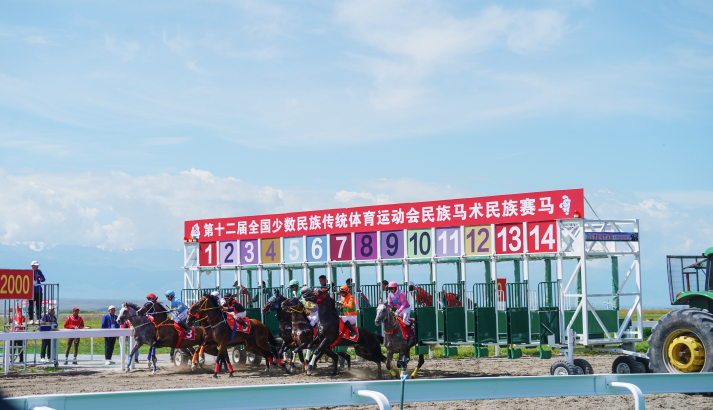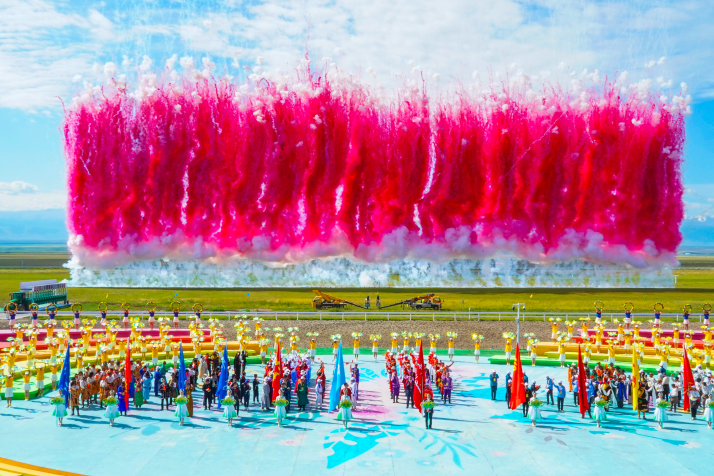
The 2000m horse race begins on July 8 in Zhaosu County, Ili Kazak Autonomous Prefecture of Xinjiang Uygur Autonomous Region (YIN KANG)
Aug. 1, 2024 -- On July 4, 15 equestrian athletes from Yushu Tibetan Autonomous Prefecture in Qinghai Province traveled to neighboring Xinjiang Uygur Autonomous Region for the equestrian events of the 12th National Traditional Games of Ethnic Minorities.
Their destination was the grasslands of the Tianshan Mountains in Zhaosu County of Ili Kazak Autonomous Prefecture, where they were reunited with their horses, which had traveled there for eight days by road.
From July 8 to 13, they participated in friendly competition with other top athletes in events such as horse racing and horseback archery. Exhibition categories at the event allowed participants to showcase non-competitive equestrian elements derived from their cultures and lifestyles.
Held in mid-summer, the equestrian events took place ahead of more than 160 other traditional ethnic minority competitions and exhibitions, which will all kick off in Sanya, Hainan Province, in November.
"All athletes from the Qinghai delegation are ordinary Tibetan farmers and herders. Equestrian culture is flourishing in Yushu region, with horses being cherished as part of the family," Wuang, head of Yushu Equestrian Association, told Beijing Review. In addition to participating in the competitions, they also presented their traditional folk horse performance, Kangba Rongjiu, to spectators.
Kangba Rongjiu involves riders hooking their toes into the stirrups, leaning back to grab their horse's tail and hanging from its sides—their heads almost touching the ground. As the horse gallops, riders rise to stand on its back, extending their arms and long sleeves while swaying gracefully from left to right in an arc. The entire spectacle resembles an eagle soaring through the wind.
"The performance showcases the rich cultural heritage of Qinghai and remarkable skills of our herders," Wuang said, emphasizing that the multi-day event provides a valuable platform not only for demonstrating equestrian skills but also for fostering friendship between ethnic groups.
Although it was his second time participating in the games, Wuang said he felt excited as he entered the arena with his team members. "I am proud that Yushu Equestrian Association can represent Qinghai in competition with other delegations. It's a wonderful opportunity to feel that all ethnic groups are part of one big family," he said.

Delegates participating in the equestrian events of the 12th National Traditional Games of Ethnic Minorities of China at the opening ceremony on July 8 in Zhaosu County, Ili Kazak Autonomous Prefecture of Xinjiang Uygur Autonomous Region
Friends
The Qinghai athletes began training for the event in March this year. "Because of our herding responsibilities, we were only able to practice for 10 to 15 days each month. However, everyone has shown great enthusiasm," Wuang said.
They also felt great pressure as athletes from Xizang and Inner Mongolia autonomous regions are very competitive, he continued. "We have made many new friends with whom we can discuss and exchange horse-riding skills."
"Mutual learning and exchange are the goals of the games as the performance of each team showcases the unique culture of their ethnic group," Liu Hongqin, a coach from the Inner Mongolian delegation told Xinhua News Agency.
Bekjan Bekturson, an athlete from the Xinjiang delegation, was delighted to welcome the Inner Mongolian delegation. As he had previously worked at an equestrian club in Hohhot, the capital of Inner Mongolia, three members of the Inner Mongolian delegation were his former colleagues.
Having grown up in Zhaosu, Bekjan has a deep understanding of the county's climate and conditions for competition. Prior to the games, he exchanged information with his friends about the infrastructure, facilities and equipment inside the arena, as well as essential items they should bring.
Bekjan operates a stable with 10 horses in his hometown, and is transitioning from being a rider to a stable manager. "Many people have purchased horses in Zhaosu but are unable to always be present for their care and training. Two of my friends and I assist with these responsibilities while earning money and spending time with our beloved horses," he told Xinjiang Daily newspaper.
A national celebration
Zhaosu, situated in a high-altitude inter-montane basin, is the only county in Xinjiang that does not have deserts. The region has abundant water and lush pastures and has been renowned since ancient times as a key production hub for the Ili horse, known as Tianma ("heavenly horse").
In recent years, the county has placed great emphasis on upgrading its horse industry through substantial investments in breed improvement, infrastructure development, and organizing equestrian events. This has made it an ideal location for national equestrian events such as those of the 12th National Traditional Games of Ethnic Minorities.
The equestrian competition included contest and exhibition categories and featured the largest number of participating teams ever, with 229 athletes from 12 delegations.
The national minority games have been held every four years since the second edition in 1982. This event is jointly sponsored by the National Ethnic Affairs Commission and General Administration of Sport of China, and hosted by local governments.
Since the first edition in 1953, the number of participants has increased from some 400, representing 13 ethnic groups including Han, Mongolian and Hui, to nearly 10,000 encompassing all of China's 56 ethnic groups. The numbers of competition events and exhibition events have risen from five and three to 18 and over 160, respectively. These events stem from the daily life, culture and festive traditions of China's ethnic groups.


